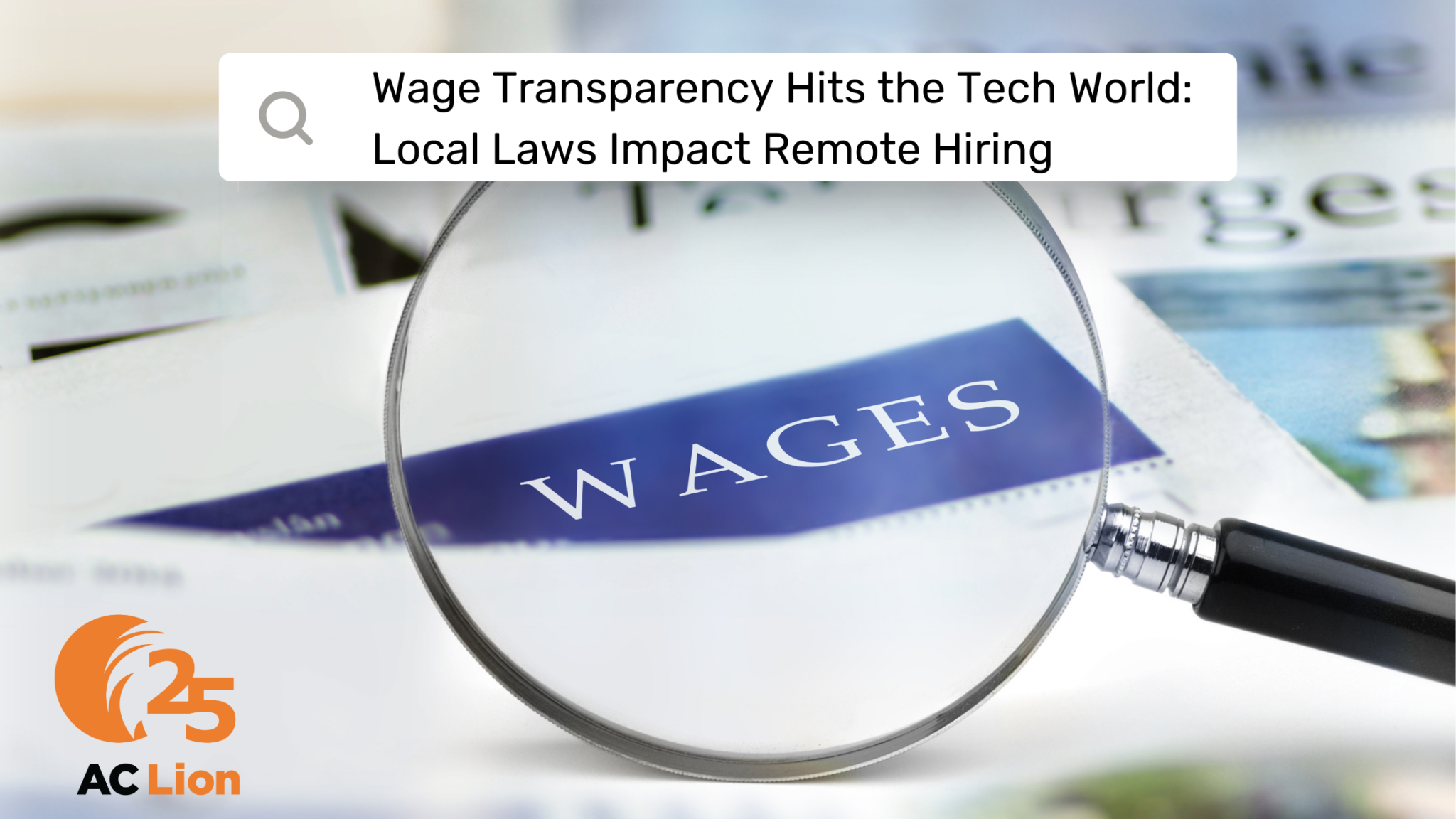Wage Transparency Hits the Tech World: Local Laws Impact Remote Hiring


On November 1, New York City will require the posting of salary ranges on all job ads. The Big Apple joins an ever-increasing number of states and municipalities enacting similar laws. Seventeen places nationwide have already enacted pay transparency laws including Maryland, Washington, Nevada, and Rhode Island, among others – and California’s law goes into effect on Jan 1, 2023, just two months after New York City. Pay transparency is now a movement spreading across the US.
Inc. magazine has called 2022 “The Year of Pay Transparency”. This is part of the recent effort of American society to level the playing field. It builds on previous laws like ban the box (now over 20 years old), asking about previous salaries, and DEI initiatives that were designed to counteract historic gender and racial inequities. The COVID pandemic, which disproportionately impacted minority workers, exacerbated an already bad situation in terms of compensation inequality. We have all seen the data that women and minorities earn much less than males. Nevertheless, it persists.
Knowing that your salary is fair and in line with your colleagues decreases resentment and improves workplace cultures, according to an ERE Blog on the topic. This is especially critical for DEI candidates, who often had lingering questions in their head. Now that the proverbial doors were thrown open to them, were they being fairly compensated? These laws address those questions and bring them out into the daylight.
With names like “Equal Pay for Equal Work Act” (Colorado and Maryland) or “Equal Pay and Opportunities Act” (Nevada), the goals are clear. It’s the work that you produce that determines your pay—not your race, your gender, or national identity. It is no longer who you know, but what you do – but implementing these laws does not necessary guarantee the desired results.
Colorado was one of the first states to require disclosure in job ads, in 2021. Their road was paved with good intentions, but it had an unintended effect: many online job postings said “Open to remote work, except in Colorado” or “Coloradans need not apply” as companies tried to skirt the requirements. Many larger companies determined they would forgo Colorado talent rather than disclose salary ranges.
As these laws spread across the nation, companies will no longer be able to dodge the issues. Companies that are used to keeping information closer to the vest or testing the market to see what their compensation budget would get them, will have to change their ways. Tech startups who are used to thinking about innovation first, and policies and HR later, have to get on board.
With two of the larger tech talent markets, California and New York, joining the wage transparency movement, tech companies will need to adapt. Not disclosing the pay scales will be a sign to potential applicants, that these social issues are not important to you. In today’s talent market, where employees don’t just care about a paycheck but want more, that could be a big strike against you.
One issue impacting the recruiting process is that the devil is in the details when it comes to these laws. As they are drafted and enacted by different jurisdictions, the disclosure requirement comes at different points in the process.
- In Maryland, employers must give pay ranges when asked by candidates.
- In Connecticut, employers must give a range when an offer is extended, or upon request if asked earlier.
- Washington also has the law in place at the offer stage—but only if requested.
- Rhode Island’s law applies to promotions and transfers as well, not just new hires.
- California’s 2016 law required employers to give a pay range if asked by the candidate after the first interview. The NEW law, signed Sept 2022, expands the requirement to pay scale disclosure to employees and applicants by putting the pay scale in the job ads.
- New York City’s law requires the disclosure of the minimum and maximum salary in any job ad, posting or job description.
Many of these laws impact remote workers who may be living in those areas. This poses challenges to companies hiring nationwide.
Here at AC Lion, with a distributed workforce across the US, and helping companies hire in all US locations, including Chicago, Los Angeles, Austin and San Francisco, we have started disclosing pay ranges on all job postings, regardless of location. Like we did with the salary history bans, we have found that the best path is the high road – doing the right thing for all locations, regardless of whether it is legally required there or not. Pay transparency is designed to increase employee satisfaction and cohesion—lets help it work for all.
